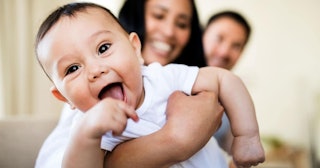Rebuilding A Better World For Our Kids After COVID-19

We are at the very height of the COVID-19 pandemic and all precautionary measures must be taken for as long as necessary. As we eventually adapt to life in the wake of the virus, the choices we make in 2020 will determine the world all future generations will live in. We can emerge as a more sustainable, healthy, just and united global society, if we put the common good at the center of every decision to revive the economy.
While this pandemic puts us all at unprecedented risk, its blow will be felt harder by some more than others. In low-income communities, families will struggle to find clean water to wash their hands, walls to keep out the virus and money to stock up on food. In cities, people suffering from respiratory and heart problems and cancer caused by air pollution will be more susceptible to COVID-19.
Yet, we are seeing the heroes among us – families donating food for neighbors and shelters, artists providing online resources for kids, and businesses shifting priorities to help those in need. Our built-in reflex to protect and help one another — particularly the most vulnerable – is being unleashed.
These instincts — to envelop those that are hardest hit with care when they are scared, sick or anxious — can help us weather COVID-19 and other crises plaguing our planet like air pollution, rampant deforestation, and climate change. They are driven by ancient genetic codes designed to secure the survival of humankind. We must follow these instincts.
Hello Africa/Getty
We are exploiting and exhausting our planet’s resources, emitting poisonous fumes and depleting the forests, mangroves and oceans that sustain us. This way of life is causing irrevocable harm to our children before they’re even born. The climate crisis makes swathes of land unlivable because of rising sea levels, extreme fires, storms and droughts, diseases that spread with heat, and many other impacts. Air pollution seeps into the lungs, hearts, brains, skin and bones as kids grow, making them more susceptible to lifelong illnesses and premature death. If you doubt the reach of this threat, consider this: nine out of 10 children — or 1.8 billion people under 15 years old — are breathing toxic air, according to the World Health Organization.
Of course, as the COVID-19 curve flattens, countries will begin to re-open their doors, companies will power back up and people will return to work. We will all go out and hug our friends and family — a little tighter than before.
But we would be remiss to return to business as usual — relying on the same fossil fuels that are exacerbating climate change and the public health emergency of air pollution — knowing what we know now. Knowing, first hand, what happens if we ignore the warnings of climate scientists and medical experts.
The economic recovery packages now being considered by political and financial leaders in response to the virus will also determine how far we can limit climate change. The science tells us that to create a fossil fuel-free, livable planet for future generations, carbon emissions must peak in 2020 and fall by half by 2030. If we try to revive the economy by investing in high carbon projects and industries, we will lose the opportunity to bend the curve of emissions in this decade. But if leaders seize the unprecedented opportunity presented by all-time low interest rates to speed up the low-carbon transition, they will guide us safely toward a better tomorrow.
Thomas Barwick/Getty
This is a moment to adjust our GPS toward a cleaner, healthier and more livable tomorrow. It’s time to invest in public health funding and climate solutions. It’s time to plant more trees and build low-emission public transport. It’s time to double-down on the transition to cleaner ways to power our lives and our economies — wind and solar power, energy efficiency, green hydrogen — that don’t come with grave threats to our loved ones’ health and our children’s future.
It’s time for these instincts for care and survival to serve as the core of everything we do.
This is the future our children demand when they strike online and in the streets. If we have the courage to put their well-being at the center of every decision we make as a society, as a business or as a city, we will make our world healthier and more just.
We’ll see immediate benefits like fewer asthma and allergy attacks. We’ll see more resilient communities, more green spaces for outdoor activities, and fewer traumatic experiences — from wildfires to hurricanes — that lead to mental and physical health problems. We will support the families often left behind and those most vulnerable to the impacts of climate change. And we will forge a future we can be proud to hand to the next generation.
This must be the year of no excuses and no regrets. It’s time for courage over cowardice. For us all to hold our governments, corporations and the financial sector accountable. For us all to also do our part in choosing the future we want.
This article was originally published on